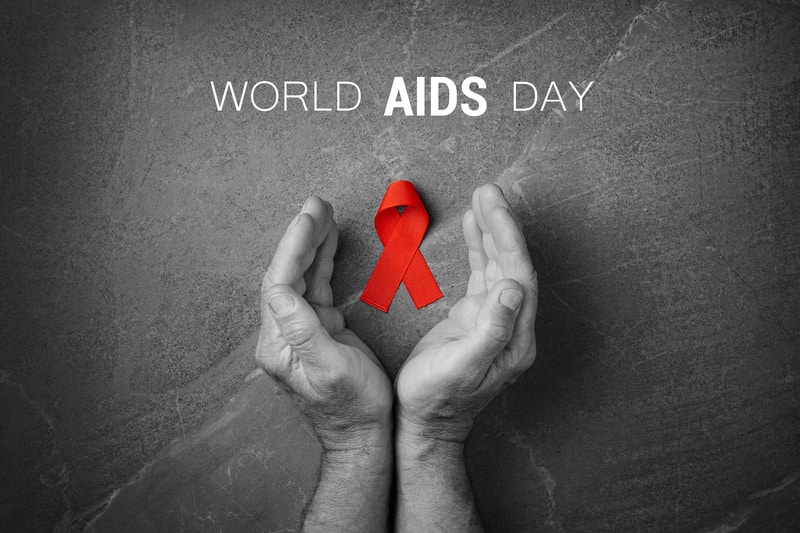Acquired immunodeficiency syndrome (AIDS) happens due to an infection from the human immunodeficiency virus (HIV). Over time, HIV will attack and break down the immune system, which plays a vital role in protecting the body from infections and diseases. People suffering from a weakened immune system are more likely to experience infections and are more susceptible to some types of cancer.
December is always AIDS awareness month, as it’s crucial to stay aware of this deadly disease. Frequent cancer seen in AIDS patients is Kaposi sarcoma, while other types of AIDS-defining cancers include cervical cancer and some types of non-Hodgkin lymphoma. It’s recommended for people with HIV to take the antiretroviral drug combination known as HAART (highly active antiretroviral therapy), which helps decrease the risk of getting aids-related cancer. Additionally, people with HIV cancer that’s not strongly linked with AIDS have a much greater survival rate by taking HAART, whether liver cancer, anal cancer, or Hodgkin lymphoma.
Aids Related Cancer – Can HIV Cause Cancer?
Understanding the risk factors between HIV and cancer is vital in staying proactive against this deadly disease. The suppression of the immune system, exposure to tobacco, and infection with cancer-related viruses are all significant risk factors. Fortunately, some types of cancer are much more likely to be curable by scheduling a preventative screening at a medical facility. Catching HIV-related cancer during its early stage can significantly increase your chance of experiencing a full recovery. A few common examples of screening for AIDS-related cancer include anal, and cervical Pap smears.
How AIDS-Related Cancer Treatment Continues to Evolve
The treatment for HIV cancer continues to change over time due to advances in medical research. For example, someone recently diagnosed with HIV/AIDS Kaposi sarcoma will most likely be treated with antiretroviral therapy. This treatment helps build a more robust immune system, which is essential in fighting against HIV cancer. Another significant advancement in treating aids-related cancer is understanding how to treat people with non-Hodgkin lymphoma. Initially, many doctors were concerned that a weakened immune system due to HIV/AIDS would not handle chemotherapy for treating and curing non-Hodgkin lymphoma.
However, a significant amount of research has happened in the last decade that shows how combining highly active antiretroviral therapy and intensive chemotherapy results in a good outcome for the patient. It’s now even possible to perform stem cell transplants for people with HIV. Many clinical trials are focused on providing treatment for cancer-associated with HIV. Understanding how immunotherapy interacts with different HIV medications and how it impacts viral load and CD4 counts are critical aspects of learning how to provide more effective HIV cancer treatment.
The Impact of AIDS-Related Cancer Treatment
Antiretroviral therapy has helped reduce HIV cancer, as researchers are continually looking at new methods to provide more effective treatment options. Diseases such as Kaposi sarcoma experienced a significant decline due to protease inhibitors in the latter half of the 1990s. Using this treatment also helped reduce the severity of disease, as it’s now more common to see milder cases limited to the skin. Even just beginning antiretroviral therapy helps boost the immune system, which is crucial in fighting against HIV cancer.
Additional Things to Consider with Antiretroviral Therapy
People receiving antiretroviral therapy are still at risk of getting diseases due to weaker immune systems. For example, a person with HIV is at greater risk of getting lymphoma, and they may also be more susceptible to different types of virally caused cancers. Other risks include Kaposi sarcoma, anal cancer, and cervical cancer. Getting vaccinated for HPV is important in staying proactive against these preventable cancers. Additional medical research is needed to understand further the relationship between the immune system, viruses, and chronic HIV infection.
Common Misconceptions About HIV and Cancer
Aids awareness month is important in dispelling common myths associated with HIV cancer. One common misunderstanding is that a diagnosis of Kaposi sarcoma means that you have AIDS, but this isn’t always true. People that are HIV-negative can still get Kaposi sarcoma. It’s also important to remember that HIV infections can be controlled using antiretroviral therapy, as many of these people have a normal life expectancy.
Closing Thoughts
Understanding the relationship between HIV and cancer is key to spreading awareness and staying proactive against this disease. December is AIDS awareness month, making it necessary to learn about aids-related cancer. Learning about the different treatment options is key if you or someone you know suffers from HIV cancer. The medical world continues to evolve with additional research and clinical trials.

